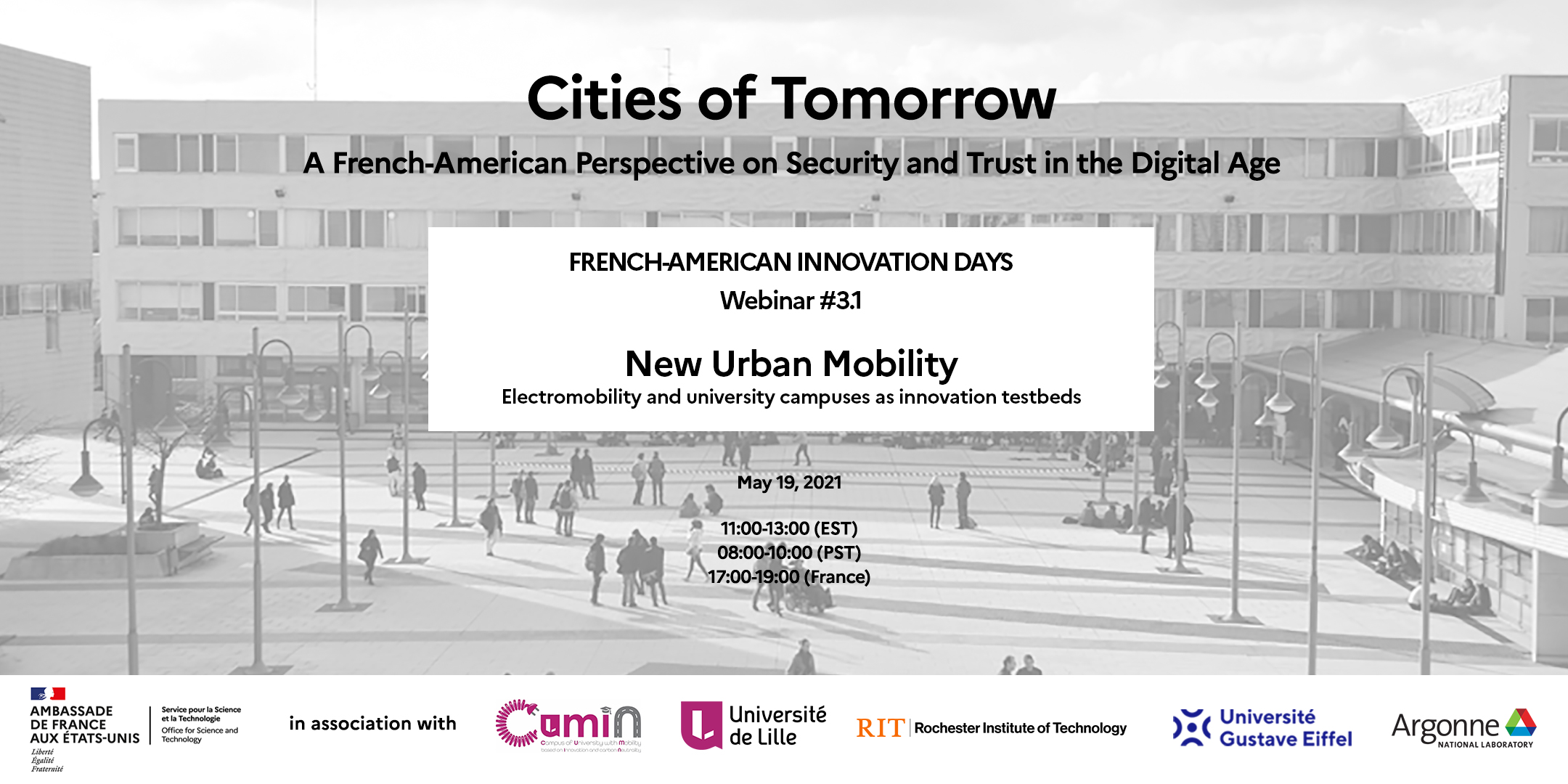Séminaire en ligne, électro-mobilité, 19 mai 2021
Webinar
New Urban Mobility: Electro-mobility and university campuses as testbeds
19 May 2021


Webinars on New Urban Mobility: The Office for Science and Technology of the French Embassy at United States of America has organized this webinar on New Urban Mobility to share the experience of US and French teams on the topic, strengthen existing collaborations, and initiate new ones. Redefining urban mobility is at a critical strategy for reducing its environmental footprint while enabling mobility access. This mobility transition will harness the benefits of new technologies such as vehicle electrification, transport digitalisation, etc.
→ Final programme and registration ←
Preliminary Program
16h:50 (CET) / 10:50 (EDT), Early connection
- 17:00 / 11:00
- Kathleen O’CONNOR, Vice-President of International Affairs, Univ. Lille, Kévin Kok HEANG, Deputy-Attaché for Science & Technology, Embassy of France
Brief Welcome, Introductory Remarks
- Kathleen O’CONNOR, Vice-President of International Affairs, Univ. Lille, Kévin Kok HEANG, Deputy-Attaché for Science & Technology, Embassy of France
- 17:05 / 11:05
- Pr. Alain BOUSCAYROL, (CUMIN, L2EP, Univ. Lille, France)
CUMIN: Campus of University with Mobility based on Innovation and carbon Neutrality
- Pr. Alain BOUSCAYROL, (CUMIN, L2EP, Univ. Lille, France)
- 17:25 / 11:25
- Pr. Eric HITTINGER, (CUMIN, Rochester Inst. of Tech., USA)
CUMIN – Technical Economical Study of Sustainable campuses
- Pr. Eric HITTINGER, (CUMIN, Rochester Inst. of Tech., USA)
- 17:45 / 11:45
- Eugénie MASCLEF, Dr. Elodie CASTEX, (CUMIN, TVES, Univ. Lille, France)
CUMIN – Social Acceptance of electrified vehicles in Restricted Areas
- Eugénie MASCLEF, Dr. Elodie CASTEX, (CUMIN, TVES, Univ. Lille, France)
- 18:05 / 12:05
- Aymeric ROUSSEAU, (Argonne National Lab, USA)
Energy and Mobility Impact of SMART Technologie
- Aymeric ROUSSEAU, (Argonne National Lab, USA)
- 18:25 / 12:25
- Dr. Rochdi TRIGUI, (University Gustave Eiffel, France)
Impact of the driving behaviour on the energetic performance of electric vehicles
- Dr. Rochdi TRIGUI, (University Gustave Eiffel, France)
- 18:45 / 12:45
- Kévin Kok HEANG , Deputy-Attaché for Science & Technology, Embassy of France
Round Table
- Kévin Kok HEANG , Deputy-Attaché for Science & Technology, Embassy of France
19:00 / 13:00, End of Webinar
CUMIN (Campus of University with Mobility based on Innovation and carbon Neutrality) is an interdisciplinary programme of University of Lille to develop its campus “Cité Scientifique” as a demonstrator for electro-mobility. CUMIN is supported by the i-SITE ULNE foundation, the European Metropole of Lille and the “Haut-de-France” (Northern France) region. CUMIN has developed intenational collaboration with Canada (Univ. Trois Rivières), USA (Rochester Inst. Tech), Belgium (Univ. Ghent) and China (Tsinghua Univ). Pr. Bouscayrol will present the general framework of CUMIN and some technical aspects. Pr. Hittinger (RIT, USA) will present some economical aspects of CUMIN. Mrs. Masclef (Univ. Lille) will present some social aspects of CUMIN.
Presentation on “Impact of the driving behaviour on the energetic performance of electric vehicles » – EVs are supposed to be the most efficient transport mean today. Meanwhile, their energy consumption and autonomy are impacted by many factors like traffic, weather, road slopes… One of these factors depends directly on the driver behavior. Optimization algorithms demonstrate the existence of large potential to save energy while switching from a “normal” to an ‘eco” driving style. CEVE project has conducted an experiment to show how Eco-driving rules could be efficient even for new EV adopters. This experiment has defined driving styles that could be used in an city evaluation as done in the CUMIN-EVE project.
CUMIN (Campus à Mobilité Innovante et Neutre en carbone), le programme interdisciplinaire de l’Université de Lille, sera présenté lors du webinaire « Cities of Tomorrow – Webinar #3.1 – Electromobility and university campuses » organisé par la Mission Sciences et Technologies de l’ambassade de France aux Etats Unis, qui organise des échanges entres scientifiques des 2 pays.
3 présentations sur 5 porteront sur CUMIN : Alain Bouscayrol (L2EP, Univ. Lille), Eric Hittinger (RIT, USA), Eugénie Masclef et Elodie Castex (TVES, Univ. Lille). De plus, Kathleen O’Connor, Vice-Présidente Relations Internationales de l’Université de Lille. CUMIN et l’Université de Lille sont donc à l’honneur dans cette session sur les campus du futur.
Short Biographies
 Alain BOUSCAYROL received Ph.D. degree in Electrical Engineering from Institut National Polytechnique de Toulouse, France, in 1995. He is currently (Full) Professor at University of Lille, France. From 2004 to 2019, he managed the national network on Energy Management of Hybrid Electric Vehicles (MEGEVH) France. Since 2015, he has been coordinator of the CUMIM (Campus of University with Mobility based on Innovation and carbon Neutrality) interdisciplinary programme of University of Lille. Since 2018, he has been co-director of the international research lab e-CAMPUS on sustainable mobility and also coordinator of PANDA a European H2020 project on simulation and testing of electrified vehicles. His research include control and energy management of various electrified vehicles, from car to trains. He is currently General Chair of the steering committee of Vehicle Power Propulsion Conference of IEEE Vehicular Technology Society.
Alain BOUSCAYROL received Ph.D. degree in Electrical Engineering from Institut National Polytechnique de Toulouse, France, in 1995. He is currently (Full) Professor at University of Lille, France. From 2004 to 2019, he managed the national network on Energy Management of Hybrid Electric Vehicles (MEGEVH) France. Since 2015, he has been coordinator of the CUMIM (Campus of University with Mobility based on Innovation and carbon Neutrality) interdisciplinary programme of University of Lille. Since 2018, he has been co-director of the international research lab e-CAMPUS on sustainable mobility and also coordinator of PANDA a European H2020 project on simulation and testing of electrified vehicles. His research include control and energy management of various electrified vehicles, from car to trains. He is currently General Chair of the steering committee of Vehicle Power Propulsion Conference of IEEE Vehicular Technology Society. Dr. Eric HITTINGER holds a BSE in Polymer Science and Engineering and a MS in Macromolecular Science from Case Western Reserve University and a PhD in Engineering and Public Policy from Carnegie Mellon University. He has an appointment as an Associate Professor in Public Policy and is Affiliated Faculty at the Golisano Institute for Sustainability at Rochester Institute of Technology. He has a background in electricity technology, policy, operation, and economics, with a focus on understanding the benefits and limitations of emerging technologies, including energy storage, electric vehicles, and renewable electricity sources. Before entering the energy field, he was a Project Management Engineer for the US Army, with extensive travel to support military operations abroad. He is currently managing the TESS (Technical Economical Study of Sustainable campuses based on electro-mobility) project of the CUMIN programme of University of Lille.
Dr. Eric HITTINGER holds a BSE in Polymer Science and Engineering and a MS in Macromolecular Science from Case Western Reserve University and a PhD in Engineering and Public Policy from Carnegie Mellon University. He has an appointment as an Associate Professor in Public Policy and is Affiliated Faculty at the Golisano Institute for Sustainability at Rochester Institute of Technology. He has a background in electricity technology, policy, operation, and economics, with a focus on understanding the benefits and limitations of emerging technologies, including energy storage, electric vehicles, and renewable electricity sources. Before entering the energy field, he was a Project Management Engineer for the US Army, with extensive travel to support military operations abroad. He is currently managing the TESS (Technical Economical Study of Sustainable campuses based on electro-mobility) project of the CUMIN programme of University of Lille. Eugénie MASCLEF received a MS. degree in Urbanism in 2019 from University of Lille, France. She is currently PhD student in urban planning of sustainable campuses in co-supervision between University of Lille and University of Trois Rivières, Canada within the framework of the eCAMPUS international associated laboratory. She is also involved in CUMIN (Campus of University with Mobility based on Innovation and carbon Neutrality) interdisciplinary programme. Her mean research activities deal with urban planning and sustainability at TVES (Territoires, Villes, Environnement et Société) Lab.
Eugénie MASCLEF received a MS. degree in Urbanism in 2019 from University of Lille, France. She is currently PhD student in urban planning of sustainable campuses in co-supervision between University of Lille and University of Trois Rivières, Canada within the framework of the eCAMPUS international associated laboratory. She is also involved in CUMIN (Campus of University with Mobility based on Innovation and carbon Neutrality) interdisciplinary programme. Her mean research activities deal with urban planning and sustainability at TVES (Territoires, Villes, Environnement et Société) Lab. Aymeric ROUSSEAU (Argonne National Laboratory, US Department of Energy, USA) is the Manager of the Vehicle and Mobility Systems Section at Argonne National Laboratory. He received his engineering diploma at the Industrial System Engineering School in La Rochelle, France in 1997 and an Executive MBA at Chicago Booth in 2019. For the past 20 years, he has been evaluating the impact of advanced vehicle and transportation technologies from a mobility and energy point of view including the development of Autonomie (vehicle system simulation) and POLARIS (large-scale transportation system simulation). In addition to leading numerous projects for OEMs and US Department of Energy, he has been providing the vehicle energy consumption analysis for the US CAFE regulations and has authored or co-authored more than 150 papers related to vehicle electrification and mobility.
Aymeric ROUSSEAU (Argonne National Laboratory, US Department of Energy, USA) is the Manager of the Vehicle and Mobility Systems Section at Argonne National Laboratory. He received his engineering diploma at the Industrial System Engineering School in La Rochelle, France in 1997 and an Executive MBA at Chicago Booth in 2019. For the past 20 years, he has been evaluating the impact of advanced vehicle and transportation technologies from a mobility and energy point of view including the development of Autonomie (vehicle system simulation) and POLARIS (large-scale transportation system simulation). In addition to leading numerous projects for OEMs and US Department of Energy, he has been providing the vehicle energy consumption analysis for the US CAFE regulations and has authored or co-authored more than 150 papers related to vehicle electrification and mobility. Rochdi TRIGUI received the electrical engineering degree from the National High Schoolof Electrical and Mechanical Engineering of Nancy, France, in 1993 and the Ph.D. degree in electrical engineering in 1997 from the Polytechnic National Institute of Lorraine, France. He then worked for one year as an associate researcher with PSA Peugeot Citroën. Since 1998, he has been a full researcher (senior since 2012) with the University Gustave Eiffel (former IFSTTAR and INRETS) in the field of modelling and energy management of electric and hybrid vehicles. From 2008 to 2015 he has been leading the Electric and Hybrid Vehicles team of the Transport and Environment Laboratory of IFSTTAR. He is now deputy head of AME department of Gustave Eiffel University. He is also currently member of the French MEGEVH network. He was co-chair of IEEE VPPC 2010.
Rochdi TRIGUI received the electrical engineering degree from the National High Schoolof Electrical and Mechanical Engineering of Nancy, France, in 1993 and the Ph.D. degree in electrical engineering in 1997 from the Polytechnic National Institute of Lorraine, France. He then worked for one year as an associate researcher with PSA Peugeot Citroën. Since 1998, he has been a full researcher (senior since 2012) with the University Gustave Eiffel (former IFSTTAR and INRETS) in the field of modelling and energy management of electric and hybrid vehicles. From 2008 to 2015 he has been leading the Electric and Hybrid Vehicles team of the Transport and Environment Laboratory of IFSTTAR. He is now deputy head of AME department of Gustave Eiffel University. He is also currently member of the French MEGEVH network. He was co-chair of IEEE VPPC 2010.
Soutenance de Thèse, Stéphane Vienot, 7 Mai 2021
“Sustainable development & renewable energy applications using EMR formalism”, 17, 18, 19, 20 May 2021







